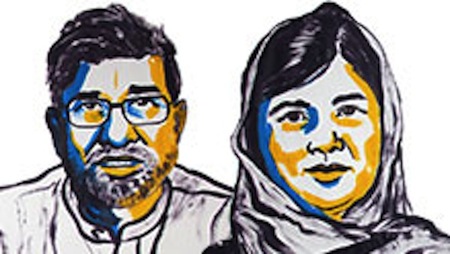Malala Yousafzay and Kailash Satyarthi Win Nobel Peace Prize

This year's Nobel Peace Prize has been awarded to two children's rights activists, Kailash Satyarthi and Malala Yousafzay, "for their struggle against the suppression of children and young people and for the right of all children to education," the Norwegian Nobel Committee announced today (Oct. 11).
Seventeen-year-old Yousafzay is now the youngest ever recipient of the prestigious prize, according to committee officials. Almost exactly two years ago, on Oct. 9, 2012, Yousafzay — then 15 years old — was shot in the head by a Taliban gunman for campaigning for the rights of girls to go to school in her home country of Pakistan. The teenager was critically injured, but survived the assassination attempt.
Since then, Yousafzay has become a prominent global advocate for education. [5 Influential Leaders Who Transformed the World]
"Despite her youth, Malala Yousafzay has already fought for several years for the rights of girls to education, and has shown by example that children and young people, too, can contribute to improving their own situations," the Norwegian Nobel Committee said in a statement. "Through her heroic struggle she has become a leading spokesperson for girls' rights to education."
Satyarthi, 60, is an Indian children's rights activist who has fought against child labor and other forms of abuse and exploitation.
"Showing great personal courage, Kailash Satyarthi, maintaining Gandhi's tradition, has headed various forms of protest and demonstrations, focusing on the grave exploitation of children for financial gain," according to the Norwegian Nobel Committee. "He has also contributed to the development of important international conventions on children's rights.
In their work, the two activists have highlighted the need to educate and empower the youngest members of society.
Sign up for the Live Science daily newsletter now
Get the world’s most fascinating discoveries delivered straight to your inbox.
"It is a prerequisite for peaceful global development that the rights of children and young people be respected," according to the Norwegian Nobel Committee. "In conflict-ridden areas in particular, the violation of children leads to the continuation of violence from generation to generation."
The award itself also delivers an important global message.
"The Nobel Committee regards it as an important point for a Hindu and a Muslim, an Indian and a Pakistani, to join in a common struggle for education and against extremism," Thorbjorn Jagland, chairman of the Norwegian Nobel Committee, said in his announcement of the prize's recipients.
Satyarthi and Yousafzay will share the Nobel Peace Prize award of $1.25 million (8 million Swedish krona).
Follow Denise Chow on Twitter @denisechow. Follow Live Science @livescience, Facebook & Google+. Original article on Live Science.

Denise Chow was the assistant managing editor at Live Science before moving to NBC News as a science reporter, where she focuses on general science and climate change. Before joining the Live Science team in 2013, she spent two years as a staff writer for Space.com, writing about rocket launches and covering NASA's final three space shuttle missions. A Canadian transplant, Denise has a bachelor's degree from the University of Toronto, and a master's degree in journalism from New York University.









